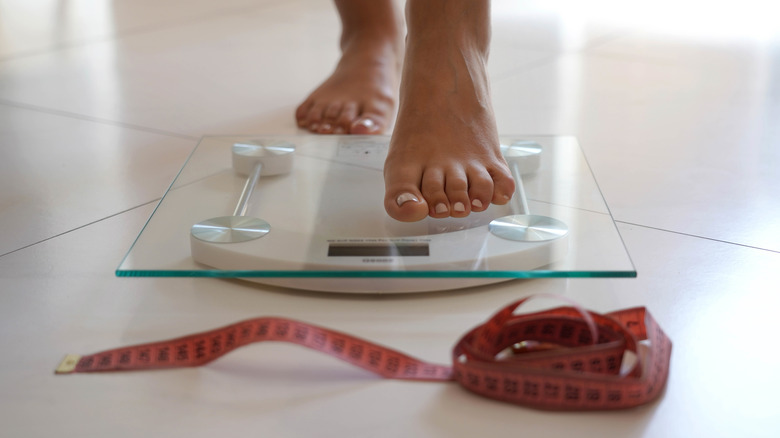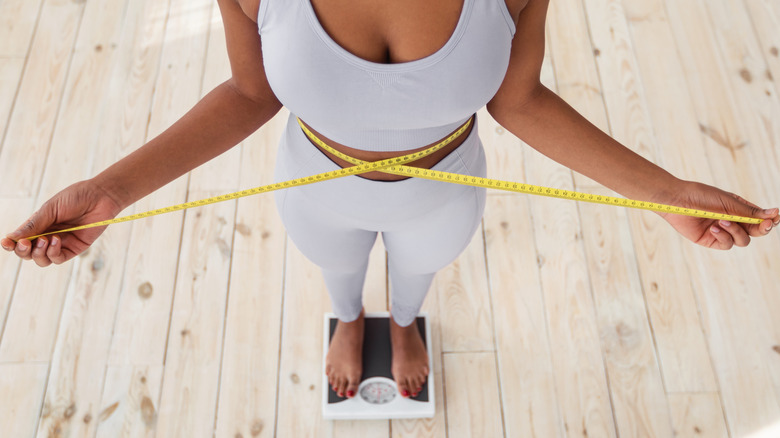Why Are You Losing Inches Without Losing Weight? Our Doctor Weighs In
Losing weight involves dedication to a healthy lifestyle, including healthy foods, regular exercise, and managing your stress, according to the Centers for Disease Control and Prevention. Even if a fad diet promises quick weight loss, a slow but steady weight loss of 1 or 2 pounds a week is more sustainable for the long term. Dr. Amy Lee, an expert in weight control, obesity, and nutrition at Nucific, says that mindfulness and motivation are helpful in losing weight.
"Once you have these two things set, you will be open to learning new skill sets, ways of thinking, and perceptions of what is important versus what is not," Lee said in an exclusive interview with Health Digest. "In any dietary regimen, it comes down to eating good quality food in moderation and implementing lifestyle changes by incorporating meaningful movement and living an intentional life."
While it might feel great to be able to fit into those clothes you shoved in the back of your closet, sometimes the scale doesn't show much weight loss. A change in your body composition or water retention are two main reasons you could lose inches without losing weight (per Healthline).
More muscle or more water
If you're adding strength training to your healthy weight loss plan, you're probably adding more muscle, especially if you're eating a little more protein, according to Healthline. This might make your clothes fit a little looser, even though you don't see much change on the scale. When you lift weights, you're changing your body composition, which means you're increasing muscle while losing fat. Although muscle doesn't weigh more than fat, it doesn't take up as much space in your body as fat. "Losing weight can simply be stepping on a scale and seeing before and after numbers," Lee said. "Losing inches reflects actual shrinking of fat tissue and a decrease in volumes."
Water also factors into your body weight. For this reason, your body weight can fluctuate up to five pounds within a single day due to water weight, according to the National Academy of Sports Medicine. Sitting at your desk for too long will cause fluid to build up on your feet and ankles. Eating a meal that's high in sodium will also cause you to hold onto excess water. If you're cutting carbs from your diet, you might see an uptick on the scale if you indulge in a high-carb meal. That's because your body needs at least 3 grams of water to store a single gram of carbohydrate in your body as glycogen (per Medical News Today).
How to address the stalled scale
Lee suggests tracking your body composition rather than the scale to help you stay motivated during your weight-loss journey. "This is another way to determine what is happening with the makeup of the body. And it is more objective in what information you are getting versus just a before and after number on the scale," she said.
Although at-home body composition scales aren't perfectly accurate, they're more affordable than a DEXA scan found at medical centers. However, if you use a body composition scale regularly under the same conditions (like the same time of day), you can track the trend of your body composition for long-term fat loss (per Houston Methodist Hospital).
If water weight is an issue, getting up every 30 minutes to move your body will help shuttle the excess fluid from your lower extremities. Exercising overall will have you sweating out excess water. To get your body back into balance after a high-salt dinner, drink more water to flush out that excess sodium. It makes sense to reduce your sodium intake, but increasing your potassium will also prevent you from retaining too much water (per the National Academy of Sports Medicine).



